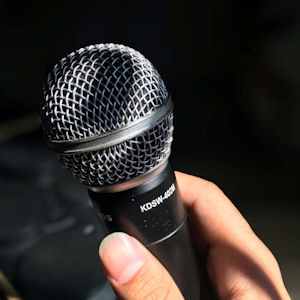Can you all hear me?
Categories: | Wedding Ceremony | Wedding Planning |
 How successful your wedding ceremony
is depends very largely on your guests being able to
hear every word. How your wedding ceremony feels is
every bit as important as how it looks, and that's a
tad more complicated because how the ceremony feels
depends very largely on your guests hearing every
word.
How successful your wedding ceremony
is depends very largely on your guests being able to
hear every word. How your wedding ceremony feels is
every bit as important as how it looks, and that's a
tad more complicated because how the ceremony feels
depends very largely on your guests hearing every
word.Guests will tell you that there is nothing more annoying at a wedding than not being able to hear the ceremony. In Australia, the Attorney General recognises this. Celebrants are required to make sure that the ceremony can be heard by everyone. It is part of the Code of Practice we all must abide by and celebrants are told that we should use a PA system to ensure that.
When marrying couples ask on wedding forums what questions they should ask celebrants, it is very common that "Do they have a PA system" is near the top of the list. Which is great. But a PA system does not fix every audibility problem. The capacity of your celebrant, the two of you, and anyone else participating in the ceremony to project their voices, is important too. A microphone magnifies sound, but it can't create it.
And that's where you, the marrying couple, come in. Because the choices you make early in your planning, and the unexpected challenges your chosen venue throws up, can have an immense impact on how well your guests will be able to hear the ceremony.
Ambient noise
The take-home message of all of this is do your homework. And then make a decision. Personally, if an occasional aircraft or helicopter flies over during a ceremony, I just pause and look up, and continue when it has gone on its way. I always suggest that you talk to your neighbours if you're having a backyard wedding and ask them not to mow or use power-tools during the ceremony.
Site and venue acoustics
I'm always relaxed when working in a historic chapel or decommissioned church. They were designed to have great acoustics. And, luckily, I have what used to be referred to as "a fine pulpit voice". In other words, I can project my voice and it carries. I'm not so relaxed when working in a modern building, particularly one that has been re-purposed for weddings but didn't start out as a ceremony space. What's on the walls, the angle of the ceiling and what it's made of, the flooring, the amount of glass, and the number of openings (doors, windows) all affect sound. Some surfaces absorb sound, some make the sound bounce around. Add human bodies to the mix - they can absorb or block the sound - and you have a problem to deal with. With any luck, the venue will have a wired in PA system that has been carefully balanced. But you need to ask questions and not just take for granted that the acoustics will be fine. You also need to take into account that objects brought in to style the ceremony space can affect the acoustics.
Background music
- The processional (formal walk in)
- The signing of the marriage documents
- The recessional (the formal walk out)
Prelude music (music played prior to the ceremony
while guests are arriving) should be soft and
contemplative so as to not only set the mood, but
also allow arriving guests to hold quiet
conversations.
Know the needs of your
guests
You will also need to work with your celebrant and venue as to where the PA amplifier is positioned in relation to where your loved one will be sitting.
But you can do more. Various forms of technology can make a huge difference to those who wear hearing aids. Some venues will have a hearing loop, infrared, or FM system. Ask. And make sure you let guests know ahead of time what is in place.
There are also other devices that can be set up to connect directly with a loved-one's hearing aid. These would require your celebrant to be wired up specifically for that in addition to using the regular microphone. I have no problems with doing that. More than happy.
Speak up!
In 17 years of being a celebrant, 15 of them legally marrying couples, I've never once had anyone complain that the vows were too loud!
Children
If the baby or toddler happens to be yours, there is no reason, legal or otherwise why you can't continue the ceremony while holding them. It can make for lovely photos.
Thanks for reading!

it is pullin0 Things